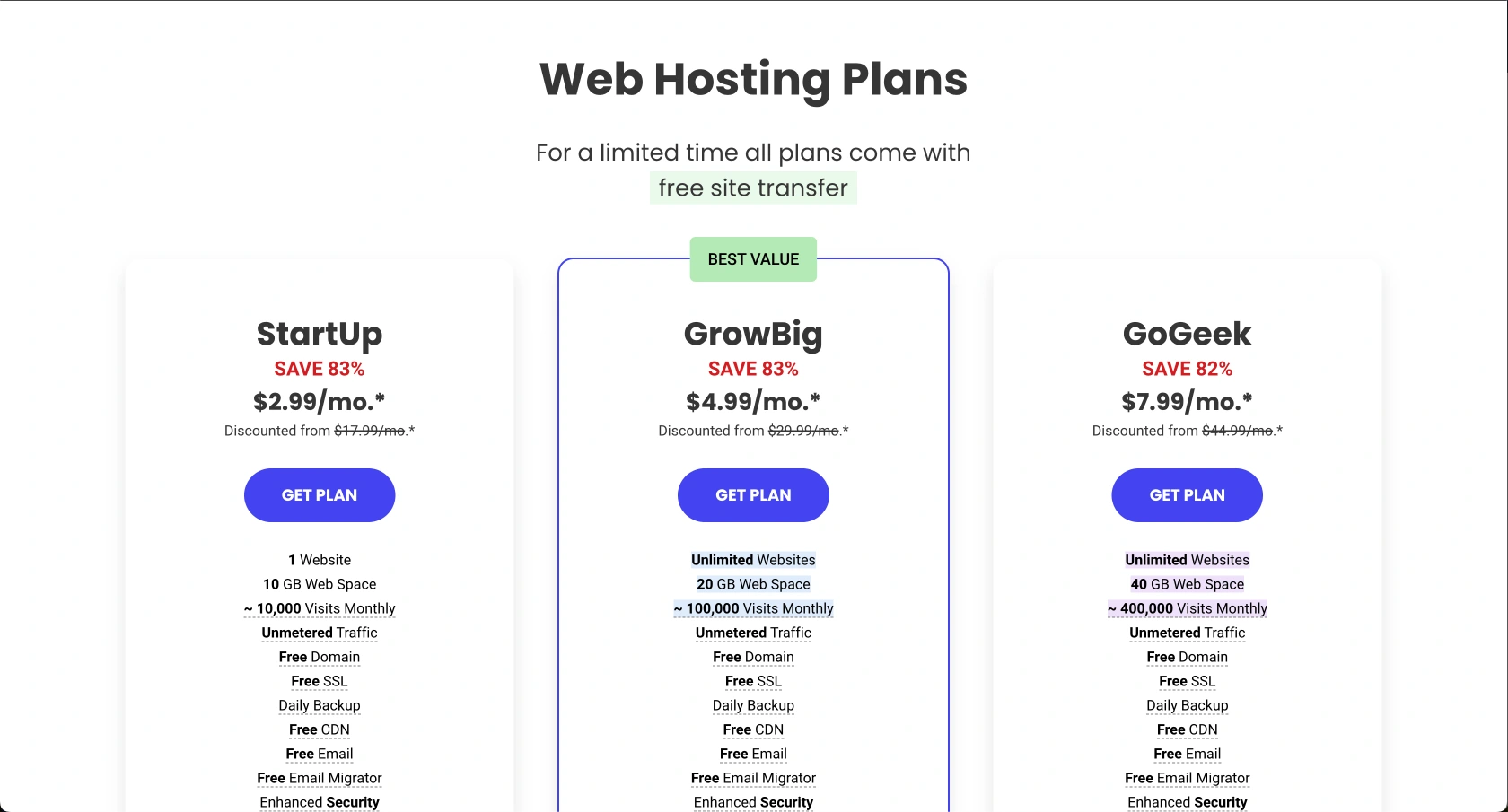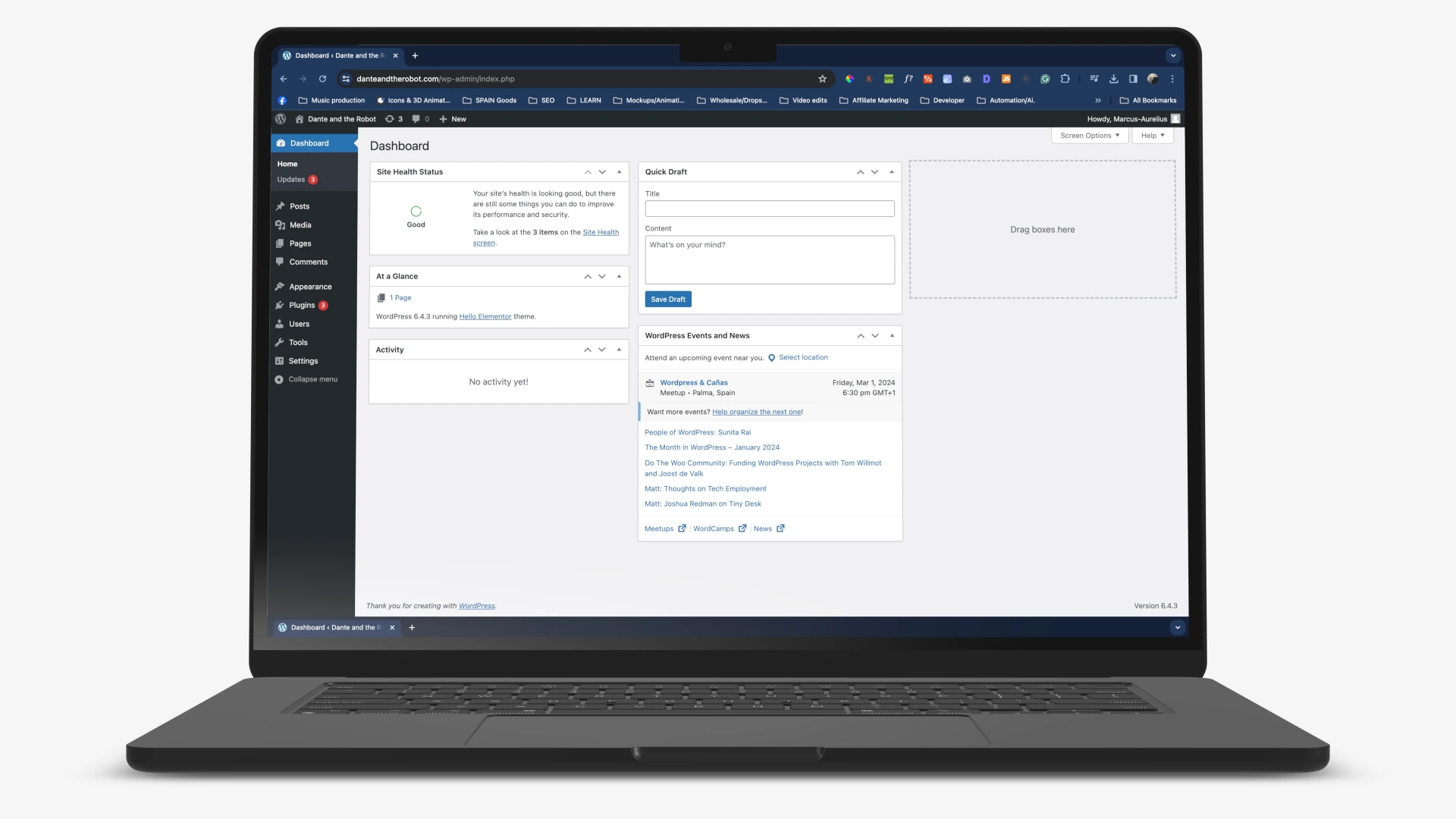Learn web hosting basics, the different types of web hosting, and what suits you best. Plus, learn how to set one up yourself.
Key Takeaways:
- The basics of web hosting and how it works.
- The different types of web hosting and when to use them.
- Consider these factors when choosing a web hosting company.
The Web Hosting Basics
Web hosting is a service that allows you to make your website accessible via the internet. It involves storing website files on a special computer called a server that is connected to the internet, making them accessible to users through a unique name called the domain name.
Image a server as the hard drive holding all your website files and content. And, anyone can have access to see what is inside through your unique domain name (www.youruniquename.com).
Types of Web Hosting
Web hosting services come in different types to meet various needs. There are four main types: Shared Hosting, Virtual Private Server (VPS) Hosting, Dedicated Server Hosting, and Cloud Hosting. Each type has its own special features and benefits.
Shared Hosting
Most probably what you need
Shared Hosting is a budget-friendly option where many different websites will be using the same server. The hosting provider takes care of the technical stuff like keeping the server running smoothly and updating security, which is helpful for users who aren’t tech-savvy. It also often includes simple tools to help you set up a website quickly.
Who is it for?
Shared hosting is best for small businesses, bloggers, and hobbyists who are starting new websites. It’s also ideal for those who need a simple, low-cost way to get online without requiring extensive web performance or resources.
Virtual Private Server (VPS) Hosting
VPS Hosting gives you a private piece of a server, even though it’s still part of a bigger server. This type allows more customization and control. You can choose between managed plans, where the hosting provider takes care of the server for you, or unmanaged plans, where you handle everything yourself.
Who is it for?
VPS hosting is suitable for medium-sized businesses, tech-savvy web developers, and bloggers who need more control and better performance than shared hosting can offer, but don’t have the budget for a dedicated server.
Dedicated Server Hosting
Dedicated Server Hosting gives you a whole server just for your website, which is perfect for sites that need a lot of resources and high security. This type of hosting lets you use all the server’s power without sharing, which means your website runs smoothly even if you get a lot of visitors or have complex needs. You can also change the server settings to exactly fit your needs, and it’s easy to add more resources as your website grows.
Who is it for?
This hosting is ideal for large businesses and high-traffic websites that require top-level security, maximum resources, and complete control over their hosting environment. It’s also well-suited for companies with custom software needs.
Cloud Hosting
Cloud Hosting uses a bunch of connected virtual servers to make sure your website is always available and runs fast. This type is very flexible—you can change how much storage and how many resources you need depending on how busy your website is. This hosting type also tends to have very reliable uptime, meaning your website is less likely to go offline unexpectedly.
Who is it for?
Cloud hosting is perfect for businesses of all sizes that need highly reliable uptime, scalability, and flexibility. It’s especially beneficial for websites with fluctuating traffic, e-commerce sites, and businesses planning for growth.
Factors to Consider when Choosing a Web Hosting Provider
Selecting the right web hosting provider involves evaluating several key factors such as uptime reliability, server speed and performance, customer support quality, pricing options, security features, and scalability for future growth.
Uptime and Reliability
Uptime and reliability are crucial aspects of web hosting, representing the percentage of time a server stays operational and the consistency of website access. A reliable web hosting provider ensures minimal downtime and uninterrupted service.
Server Speed and Performance
Server speed and performance directly influence website loading times, user experience, and search engine rankings. Optimal server performance ensures fast response times, efficient content delivery, and enhanced overall website functionality.
When a server operates efficiently, it means that it can quickly process and deliver website content to users when they access the site.
Customer Support
Always make sure that you have access to great support before going ahead with a hosting company!
Effective customer support is essential! Especially for a non-tech-savvy person, it’s a must to be able to address technical issues, resolve queries, and ensure smooth website operation at all times. Web hosting providers offering responsive customer support through various channels, including email addresses and live chat, will definitely enhance your satisfaction.
Pricing and Plans
Pricing and plans vary among web hosting providers, with options ranging from budget-friendly shared hosting to premium dedicated server solutions. Understanding the cost structures, contract terms, and features included in each plan is essential for making an informed decision.
For small websites or blogs, shared hosting can be a cost-effective option, while larger businesses may benefit from the enhanced performance of VPS or dedicated hosting.
Compare a list of trusted WordPress hosting providers here ⇒

Scalability
Scalability is crucial for accommodating website growth and traffic fluctuations over time. A scalable web hosting solution allows seamless expansion by enabling the addition of domains, resources, and features as needed.
It ensures that as your website gains popularity and experiences increased traffic from visitors, the hosting platform can effortlessly handle the load without compromising performance.
Security Features
Robust security features, such as SSL certificates, regular backups, and malware protection, are essential for safeguarding websites against cyber threats and data breaches. Web hosting providers offering comprehensive security measures enhance website integrity and user trust.
SSL certificates play a crucial role in establishing a secure connection between a user’s browser and the website server, encrypting sensitive data transfer.
- Data backups are vital to ensure quick recovery in case of accidental data loss or cyber-attacks.
- Proactive security measures, like monitoring for suspicious activities and implementing firewalls, can prevent potential security vulnerabilities.
Common security threats to websites include DDoS attacks, malware injections, phishing schemes, and SQL injections, underscoring the importance of robust security implementations.
Best practices for securing websites encompass keeping software and plugins updated, using strong passwords, limiting access privileges, and regularly scanning for malware and vulnerabilities.
How to Set Up a Website with Web Hosting
Creating a website with web hosting involves several simple steps, including selecting a domain name, choosing a suitable web hosting plan, installing a Content Management System (CMS) like WordPress, designing and customizing the website, and finally launching it for public access.
All of which can be done through the web hosting service.
Build your branded site in 8 steps ⇒

Choose a Domain Name
Selecting a domain name is the first step in establishing an online presence. It should be relevant to your website’s content, easy to remember, and aligned with your brand identity. Domain registrars offer tools to check domain availability and register chosen names.
Select a Web Hosting Plan
Choosing the right web hosting plan is crucial for website performance and scalability. Consider factors such as server resources, bandwidth limits, and specialized offerings like WordPress hosting to meet your website’s specific requirements.
Install a Content Management System (CMS)
Integrating a Content Management System (CMS) with your web hosting allows you to create, manage, and update website content efficiently. Popular CMS options like WordPress, Joomla, or Drupal offer user-friendly interfaces and extensive customization capabilities.
Design and Customize Your Website
Designing and customizing your website involves creating a visually appealing layout, selecting suitable themes and templates, and optimizing content for user engagement and search engine visibility.
If you are not a coder, use a page builder! They work just as well…
Launch Your Website
Launching your website involves making it publicly accessible on the internet. Ensure all configurations are in place, test website functionality, and announce the launch through social media and other promotional channels to attract visitors.
Learn how to build your own website from scratch
WordPress + Elementor Pro
- A global presence
- Professionalism
- Open 24/7
- Earn passive income
- So much more
Conclusion
Web hosting is really not hard to understand, it is simply a special computer that stores all of your website content and displays it to the visitor if that person decides to search for your unique name on the internet. There are various types of web hosting, but to be honest, if you are looking to understand the basics of web hosting, you most probably only require a shared hosting service.
Web hosting holds the key to building your business website (or portfolio) through popular platforms like WordPress which are free to use and usually easily downloadable through a web hosting service.
Frequently Asked Questions
What is web hosting and why do I need it?
Web hosting is a service that allows individuals and organizations to make their websites accessible on the Internet. It is necessary for anyone who wants to have a website, as it provides the storage, server, and connectivity needed to keep the site running.
What are the different types of web hosting?
The three main types of web hosting are shared hosting, virtual private server (VPS) hosting, and dedicated server hosting. Shared hosting involves sharing server resources with other websites, while VPS hosting provides a more private and customizable server environment. Dedicated server hosting is the most advanced and expensive option, offering complete control over the server.
How do I choose the right web hosting provider?
When choosing a web hosting provider, it is important to consider factors such as reliability, security, customer support, and pricing. Read reviews, compare plans and features, and make sure the provider offers enough bandwidth and storage for your website’s needs.
What is a domain name and do I need one for web hosting?
A domain name is the address of your website on the internet, such as www.example.com. While you technically do not need a domain name for web hosting, it is highly recommended as it makes your website easier to find and more professional-looking.
Can I switch web hosting providers after I have already set up my website?
Yes, it is possible to switch web hosting providers after your website is already live. However, it may involve some downtime and technical work, so it is important to research and choose the right provider from the beginning.
What security measures should I look for in a web hosting provider?
It is important to choose a web hosting provider that offers secure servers, regular backups, and reliable data protection measures. Look for providers that include SSL certificates, firewalls, and other security features to keep your website and data safe from cyber threats.”


